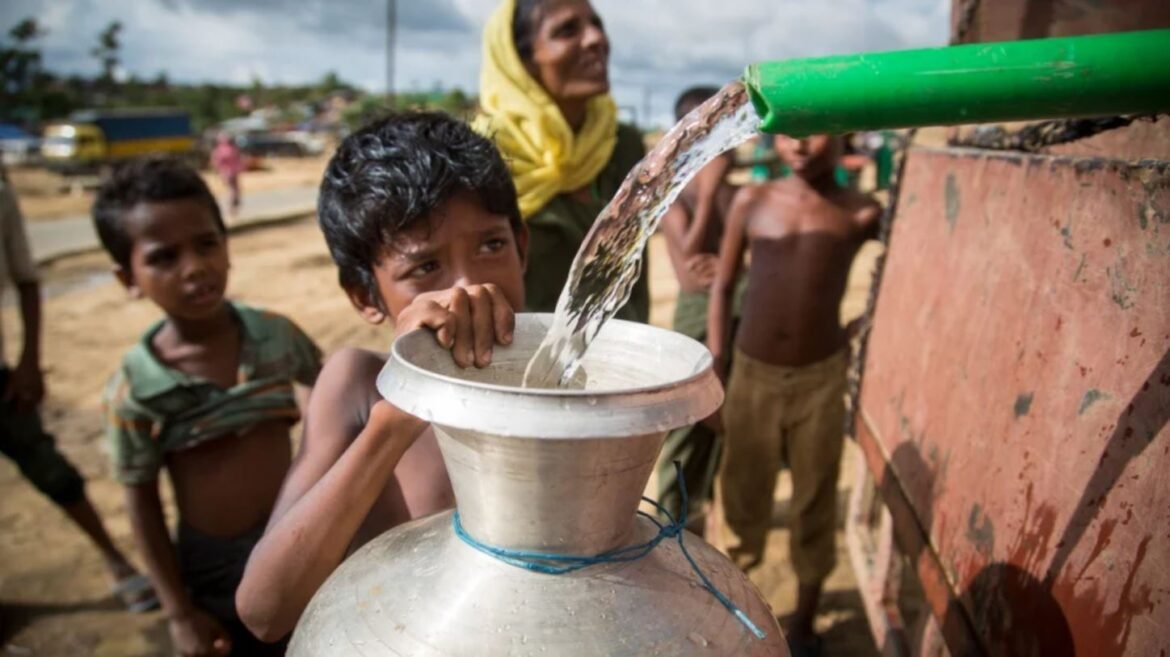From March 1 onwards, World Food Programme’s (WFP) General Food Support voucher value would be reduced from US$12 to US$10 per person per month due to US$125 million funding shortage. The monthly grant will be reduced by 17 percent per person from the same month. Additionally, the WFP has warned that further reductions may be required if new funding for Rohingya refugees is not secured by April.
The United Nations (UN), due to a budget shortfall, plans to limit food aid to Rohingya refugees in Bangladesh, which, the global agencies warned, will worsen food insecurity and malnutrition in the world’s largest refugee camp.
An estimated total of around 730,000 Rohingyas had escaped to Bangladesh in 2017 –thereby surviving a crackdown by the Myanmar army. From then, over one million Rohingya people are residing in the world’s largest refugee camp in already over-crowded Bangladesh’s Cox’s Bazar, where there are difficulties with overpopulation, instability, and violence.
Already decrease in funding
The news of food aid reduction comes at a time when already the funding for Rohingya refugees has gone down significantly in 2022 compared to the two previous years. Due to the worldwide pandemic, economic downturn, and various crises, donor budgets have been strained. While the world is paying close attention to the situation in Ukraine, less attention and aid are being given to other humanitarian situations across the world.
YOU CAN ALSO READ: WILL CHINA GIVE BANGLADESH BACKING IN ROHINGYA REPATRIATION EFFORTS?
According to experts, the decrease in funding can be attributed to the redistribution of resources to other refugee camps, most notably to help Ukrainian refugees in Europe. The decline in funding also is linked to the donor nations’ adoption of belt-tightening measures in response to the current economic recession. Officials at the agency already claimed that they could no longer provide for the unreported protection needs of women, children, and individuals with disabilities.
Now, if food funding is condensed, refugees would be unable to get the minimal nutritional intake, which is already curtailed with less funding.
Food insecurity becomes ‘immense and long-lasting’
The WFP has requested for $125 million in urgent support, fearing of “immense and long-lasting” consequences for food security and nutrition in shelters devastated by malnutrition, in which more than one-third of children remain stunted and underweight.
Save the Children’s Country Director in Bangladesh, Onno Van Manen, said in a statement, “The international donor community is now turning its back on half a million Rohingya children and their families really shows the limits of its commitment to some of the most vulnerable people in the world.”
Two U.N. Special Rapporteurs, Michael Fakhri and Thomas Andrews, issued the following warning: “If these cuts are made, they will be imposed on vulnerable people who are already food insecure,” deeming it “unconscionable” to reduce rations immediately prior to the Muslim holy month of Ramadan.
Despite extensive humanitarian efforts, 45% of Rohingya families are malnourished, and hunger is pervasive in the camps. The World Acute Malnutrition Rate for Children is 12 percent, which is marginally below the 15 percent WHO ‘Emergency’ level but is still considered ‘Serious’. Before the ration drop, nearly 40% of children had stunted growth, and 40 % of pregnant and breastfeeding women had anemia.
“With each ration cut, malnutrition will certainly rise. With each ration cut, families will increasingly resort to dangerous strategies to cope. Sadly, women, adolescent girls and children will be the worst affected. We must do everything possible to keep the vital humanitarian assistance they depend on intact,” said Domenico Scalpelli, WFP Country Director in Bangladesh.
The international NGO, “Save the Children” urges international donors not to “turn their backs” on the Rohingya. Onno Van Manen, said in a statement, “Rohingya children and their families are at breaking point and need more support, not less.”
The International Court of Justice has charged Myanmar with genocide for the 2017 crackdown. An investigation conducted by the United Nations and published the following year concluded that the military acted with “genocidal intent” and proposed the prosecution of Commander-in-chief Senior General Min Aung Hlaing and five other generals.


